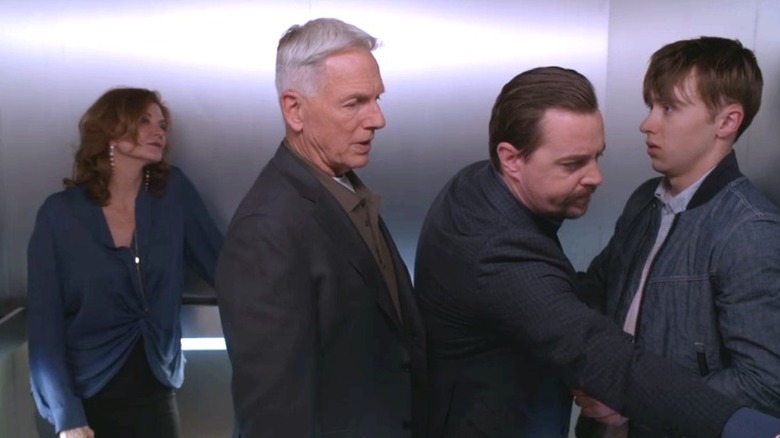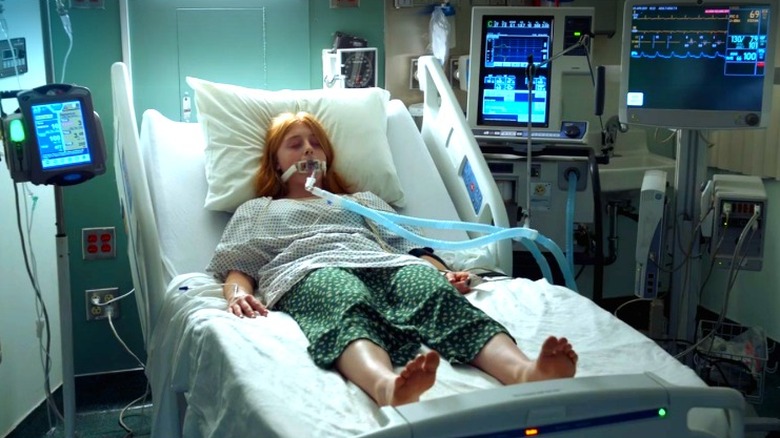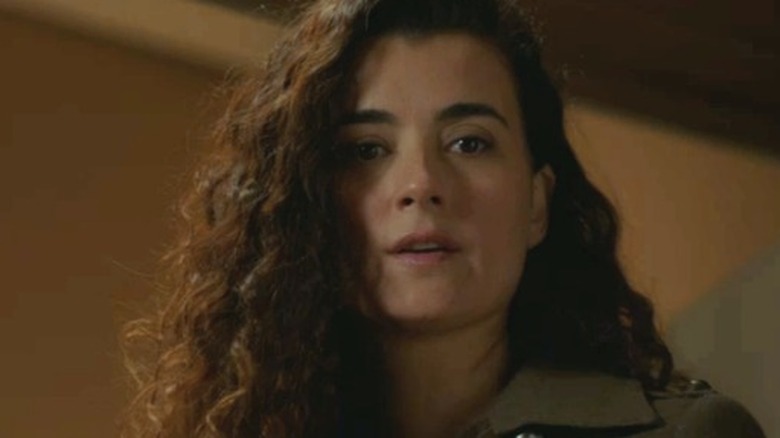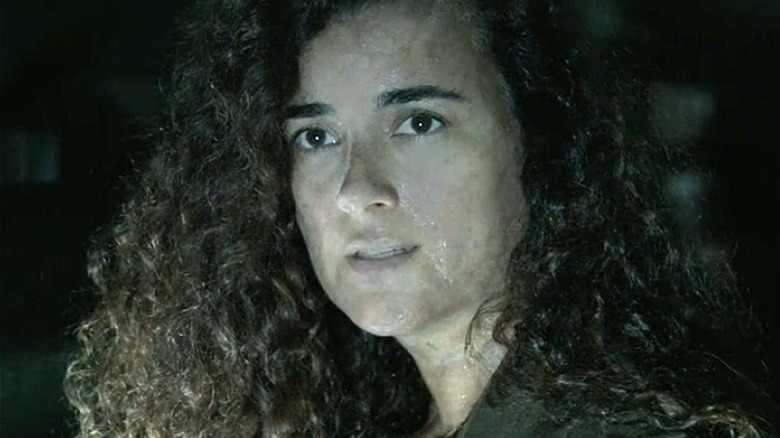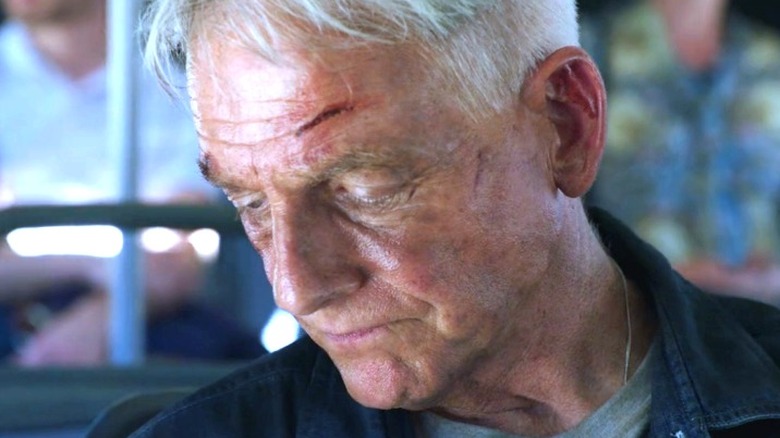This Is The Exact Moment NCIS Jumped The Shark
From the outset, "NCIS" let viewers know it was going to be a different kind of police procedural. While "NYPD Blue" and the original "Law and Order" focused on giving audiences a grittier, more lifelike spin on the ins and outs of our law enforcement and justice systems, "NCIS" had no interest in feigning, reflecting, or attempting to comment on reality. Instead, it was going to give fans a high gloss, soft focus, live-action cartoon version of an investigation show that fell somewhere between Tom Clancy Lite™ and a '90s sitcom. Its approach was enthusiastic, unabashed, and admirably shameless in its absurdity.
The series, lest we forget, kicked off with an attempt to poison then-president George W. Bush (Steve Bridges) aboard Air Force One, moved to mummified pilots falling from the sky in relatively short order, and never looked back. By Season 3, its characters were manifesting ghosts in a comedic display of mourning. Suffice it to say, when it comes to creator and former showrunner Donald Bellisario's claim to fame, the standards with which one normally judges a series' irreversible shark jump are (to say the least) slightly different. If a show starts out at an 11, one can't very well condemn it for abruptly turning the dial up to 12, or even 15.
That said, the phenomenon's near-total immunity to jumping the shark in the traditional sense couldn't save it from a Season 16 (into 17) misstep in tone and subject matter from which it has yet to recover.
NCIS' Daughters marks a major misstep
The Season 16 finale of "NCIS" ("Daughters") sets off an abysmal three-episode arc that sees the series grapple clumsily with subject matter beyond its reach, zig-zag tonally in ways that range from confusing to cringe-worthy, and sacrifice much of its unique appeal in favor of awkwardly-managed, ultimately unsatisfying fan service.
"Daughters" aired in May of 2019, when the U.S. was in the throes of a still-prevalent opioid abuse epidemic that, by 2017, was responsible for 70% of all drug overdose-related deaths (via Leidos). Between 1999 and the end of 2019, including both prescription and illicit opioid abuse, just under 500,000 people died of opioid-related overdoses (via CDC). In some ways, it makes sense that one of the most-watched shows on television at the time (per Variety) would dip its toe into a subject that was hitting close to home for so many of its viewers. Unfortunately, "NCIS" wasn't, isn't, and never has been the type of series that can manage this kind of pervasive, real-life devastation and heartache with the level of finesse and gravitas it requires.
If every third or fourth exchange on your series is a snappy, sitcom one-liner, every character a caricature, and every plot line an exercise in the absurd, any attempt to tackle an immediate, real-world crisis is going to come off, at best, as out-of-place. At worst, it presents as downright offensive, and "Daughters" comes dangerously close to crossing over into the latter.
In its Season 16 finale, NCIS overreaches
"Daughters" actually gets off to a semi-respectable start. Having Tobias Fornell's daughter Emily (Juliette Angelo) hospitalized after a near-fatal overdose reminds us that anyone, including the overachieving offspring of a former FBI agent, can develop an addiction. Unfortunately, the series is bound by a long-established, lighthearted tone that necessarily packs the episode with so much silliness and melodrama that its one decent maneuver is blocked.
Fornell (Joe Spano), for instance, pulls a gun on the doctor who reveals the cause of his daughter's hospitalization (because how dare he), while Mark Harmon's Leroy Jethro Gibbs spends the majority of the episode arguing with himself in the form of his deceased ex-wife (who, as fans will recall, is also Emily's mother/Fornell's ex-wife). Her appearances are alternately laced with stock, "seeing things" and "exes-am-I-right?" humor, cheesy self-reflection, and teen drama levels of sentiment. It's difficult to tell, from one moment to the next, if the writers were aiming for dark humor (if so, they missed), a "very special episode of," or intentional removal of realism so they could avoid the kind of factual accountability and raw relatability such subject matter demands, as seen in a certain Marvel movie's cheap and sloppy use of the agony of chemotherapy.
The episode fluctuates wildly between high-octane, revenge-driven action and plot, its characteristic "humor," and globs of unintentional camp, all of which could be forgiven, even applauded, were it not for the series swerving so far out of its thematic lane.
Emily's addiction exists in service of Gibbs' development, and that's gross
Like every other plot line ever on the long-running series, the drug abuse narrative of "Daughters" exists solely to service the flawed character of Gibbs. Rather than spend a substantial amount of time chewing on the enormous chunk of too-real subject matter the episode bites off, Episode 24 focuses, instead, on Gibbs' guilt, Gibbs' unwillingness to get "personally involved" (aka Rule No. 10), Gibbs' insecurity about what kind of "MAN" he is, and Gibbs' ghosts, both literal and metaphoric. Watching the episode, one gets the distinct impression that Emily's addiction (posited as a "shocking discovery" partway through the episode) is Gibbs' problem.
While it makes all the sense in the world for a series to center its aptly-termed central protagonist, the idea that a young woman's struggle is somehow actually about her father's best friend coming to terms with "who he is" is not only ridiculous but also cringe-worthy. Moreover, after 16 seasons, it's extraordinarily tired. Even the episode's title refers not just to Emily, but also to Gibbs' relationship with his subordinate Ziva David (Cote de Pablo).
That's right — after piling on the comedic caper-adjacent plot twists, sassy ghost wives, absurdist gun play, drug dealer murder mysteries, troubled teen dialogues, and unforgivably saccharine cheese, the episode shifts gears at breakneck speed, concluding with the surprise guest appearance of a cherished former character.
Ziva's tacked-on return only adds to the episode's failure
"NCIS" has faltered and regained its footing numerous times in its 20 season-long run, almost always as a side effect of losing a main cast member. That fans struggled to buy into Season 14, for instance, was no surprise, considering Michael Weatherly's beloved Tony DiNozzo made his last appearance in the previous season's finale. Importantly, more than a little of the appeal of Weatherly's character came not from anything inherent in the alternately sexist, insecure, and horny agent's persona, but from his will-they-won't-they dynamic with one Ziva David.
De Pablo's character, a former Mossad agent, joined the series in Season 3, and for eight full seasons, her butt-kicking, chain-pulling, button-pushing persona — coupled with her dynamics with both Gibbs and Tony — charmed and nourished viewers. Ziva first left the squad in Season 11, and in Season 13, she was reportedly killed in a mortar attack (off-screen, of course), leaving her former partner and sometimes lover Tony to look after a daughter he didn't know he had. That unresolved, surprise kid narrative came awfully close to jumping the shark, but the implication that Ziva was still secretly alive imbued it with just the right amount of potential future resolution. Sadly, Ziva's dramatic return brought viewers no such satisfaction. What's worse, it betrayed both her character and the series on a fundamental level.
NCIS failed a beloved character
Not only did Ziva's shocking reemergence in "Daughters" add to the episode's already overly-crowded and insulting treatment of its subject matter, but it also proved to be (surprise, surprise) more about the character of Gibbs than the character it purported to celebrate. In the "NCIS" Season 17 premiere, we learn that Ziva is deeply upset that Gibbs didn't come looking for her after her death was announced. She insists she left him bread crumbs and struggles to forgive him for not seeing them and coming to her rescue. This unreasonable expectation and reaction is completely out of character for an agent willing to fake her own death and give up her daughter in order to protect her. Thus, in its endeavor to once again make every narrative thread and theme All About Gibbs and His Demons, "NCIS" did one of its best characters a disservice. What's worse, it seems apparent that the writers knew they were undermining their own creation.
In what feels like an attempt to temper their reductive approach to Ziva's return, the opening of Season 17 is littered with references to her value, importance, legend, and legacy. Characters who never met Ziva — e.g., Wilmer Valderrama's Nick Torres and Emily Wickersham's Eleanor Bishop — talk repeatedly about how much she means to them in lines that nearly break the fourth wall. "This is like the biggest news of my life," Torres says of Ziva's return, impersonating an audience member in a way that feels unintentionally meta. "Ziva David is freakin' alive?!", he adds, with no small measure of what shouldn't, but very much does, come off as sarcasm (via YouTube).
NCIS jumped the shark by wading in out of its depth
Though the main plot of the three-episode arc appears to be about Ziva, the development of her storyline is shoddy and incomplete, while Gibbs' guilt and regret — a thread the narrative works much better without — is overdeveloped. And if, as "Daughters" and its related episodes suggest, no storyline can exist (no matter how serious or surprising) without being a means to Gibbs' personal development, then the show is going to have a seriously hard time from here on out. That's because Harmon left "NCIS" in Season 19.
Finally, and perhaps worse than Season 16's finale and arc overreaching in its subject matter and failing a beloved series regular, "Daughters," "Out of the Darkness," and "Into the Light" are representative of a much more damaging mistake. In all three episodes, the series betrays what made it special in the first place: a complete disregard of the brooding, real-world moroseness that permeates so much of its competition. Unfortunately, a series this defined by and reliant on its unique tone simply can't afford to be so off-pitch.
If "NCIS" were a show built around the experimental — if it could, for instance, juggle the kind of alternately serious and comical approach that "X-Files" so successfully managed — this anomaly might not be an issue. But "NCIS" isn't "X-Files," and the involvement of a comedic "death by lawn gnome" in Season 17, Episode 3 suggests the series regretted the tonal and thematic shark jump that forced it to wade in over its head, where it's been treading water ever since.


